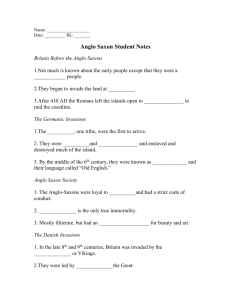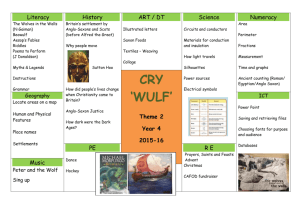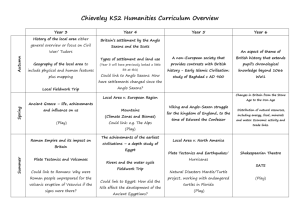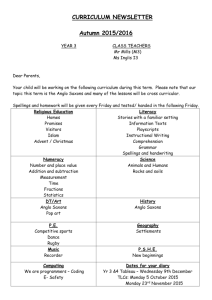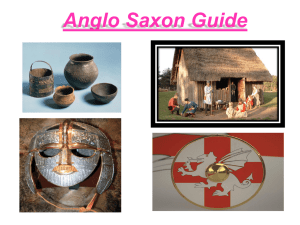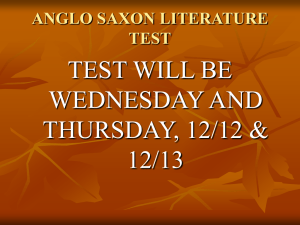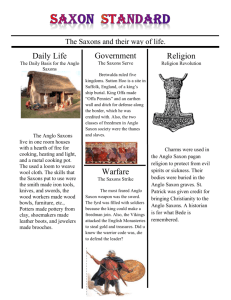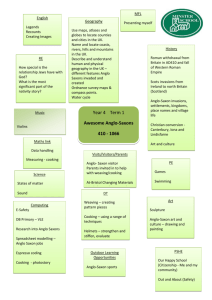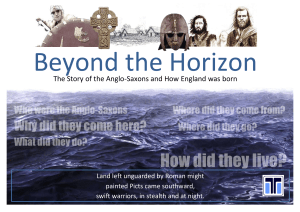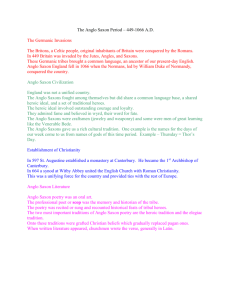Anglo Saxon History and Culture Notes
advertisement
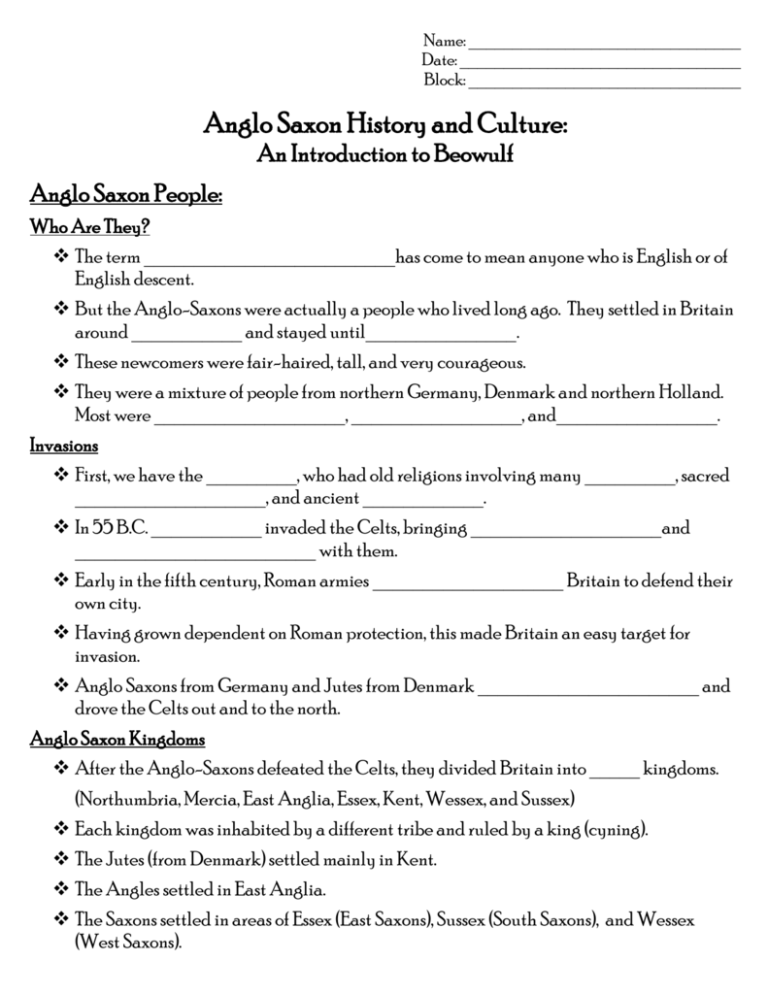
Name: _______________________________ Date: ________________________________ Block: _______________________________ Anglo Saxon History and Culture: An Introduction to Beowulf Anglo Saxon People: Who Are They? The term _________________________has come to mean anyone who is English or of English descent. But the Anglo-Saxons were actually a people who lived long ago. They settled in Britain around ___________ and stayed until_______________. These newcomers were fair-haired, tall, and very courageous. They were a mixture of people from northern Germany, Denmark and northern Holland. Most were ___________________, _________________, and________________. Invasions First, we have the _________, who had old religions involving many _________, sacred ___________________, and ancient ____________. In 55 B.C. ___________ invaded the Celts, bringing ___________________and ________________________ with them. Early in the fifth century, Roman armies ___________________ Britain to defend their own city. Having grown dependent on Roman protection, this made Britain an easy target for invasion. Anglo Saxons from Germany and Jutes from Denmark ______________________ and drove the Celts out and to the north. Anglo Saxon Kingdoms After the Anglo-Saxons defeated the Celts, they divided Britain into _____ kingdoms. (Northumbria, Mercia, East Anglia, Essex, Kent, Wessex, and Sussex) Each kingdom was inhabited by a different tribe and ruled by a king (cyning). The Jutes (from Denmark) settled mainly in Kent. The Angles settled in East Anglia. The Saxons settled in areas of Essex (East Saxons), Sussex (South Saxons), and Wessex (West Saxons). For hundreds of years the seven tribes fought in great wars against each other to gain power of the entire British Isles. The Anglo-Saxon tribes were savage, ruthless people who lived life by a strict ___________________________. They were also known for their courage and nobility in war and everyday life. Anglo Saxon Religion: The Anglo-Saxons were ___________________ when they came to Britain, but as time passed they gradually converted to ________________________________. Early Anglo-Saxon invaders brought their belief in __________, or __________, and their admiration for heroic warriors whose wyrd it was to prevail in battle. Pagans worshiped lots of ________________________________. Each pagan god controlled a particular part of everyday life. Balder: God of Immortality Thunor: God of Thunder Eostre: Goddess of Birth Tiw: God of War Hel: Goddess of Death Wade: God of the Sea Loki: God of Cunning Wayland: God of Metalworki ng Saxnot: God of the Family Woden: Chief God Our Days of the Week Tuesday: ________________ day (the god of war) Wednesday: _________________ day (chief god) Thursday: ________________day (god of thunder) Friday: ______________day (the goddess of home) _____________________________ still lingered from when Romans occupied Britain despite newly introduced ___________________beliefs. In 597, the Pope sent a missionary monk called _____________________ to England. The purpose was to __________________Anglo-Saxons into Christians. Christianity spread to other parts of Britain. Pagan temples were converted to Christian churches and new Christian ________________________________________. Christian Churches Christian Churches served as centers for _________________________. Individuals belonging to the church may have been the only ______________ people. They were the keepers of ___________________________________. Anglo Saxon Culture: Ethics and Values Anglo Saxons valued _________________, ________________, ____________________, and ___________________________. The king, or cyning, was the central part of every kingdom and tribe, and loyalty to one’s king was a _________________________________. Women were _____________________________. They were able to hold high status and be wealthy. ____________, or story-tellers (also known as _____________), were considered equal to warriors. They were valued as story-tellers, history-keepers, and entertainers. Activities The Anglo-Saxons loved ____________________ and would often have feasts in the ___________________. The food was cooked over the fire in the middle of the hall; meat was roasted and eaten with bread. They drank ale and mead - a kind of beer made sweet with honey - from great goblets and drinking horns. After the feast a scop (a bard or poet) would play a harp and sing songs of _________________________. Warrior Beliefs The Anglo-Saxon warrior's attitude toward battle was always _________________ and _______________________. They believed if they fought as hard as they could in life (wars), they would die a _________________________ on the battlefield and could __________________________________. Warriors confronted life as embracing death. They did not look at obstacles or warfare as a bad thing. They not only accepted their ______ (fate) but rejoiced in dying on the battlefield because they would achieve glory in death. In the mead hall or on the battlefield, a warrior needed to ______________ about his past and future accomplishments to create a _______________________________. However, the warrior would need to follow through on his bragging. If he didn't, he was considered a ______________________. A warrior needed both words and actions. The Anglo-Saxons relied on _______________________ to pass on their war stories, traditions, and literature. Oral Traditions Scops (shapers of tales) traveled across the country reciting historic or fictional tales of ___________________, _________________, and ______________________. Their purpose was to pass stories through generations so they would not be forgotten. Scops were both _______________________ and ________________________. Anglo Saxon Literature: In many pieces of literature (including Beowulf) there is a sudden jump from a _______________________ to a _________________. For example, warriors could be feasting and rejoicing in a mead hall and then a monster kills people. Then everyone is happy again. This symbolizes their outlook on life: ___________________________, but one must ________________ and ____________one's ________ to become a better person. Epic- long ______________ poem about _________________________, typically passed through generations ___________________ by scops and bards Examples: ___________________________________________________ Alliteration- the repetition of ____________________________ at the ___________________of words Examples: _________________________________________________________ ________________________________________________________________ Stock Epithets- __________________________________ that point out ____________________________________ of particular people or things Examples: ________________________________________________________ Kennings- poetic synonyms; ___________________________________________ ________________________________________________________________ Examples: ________________________________________________________
